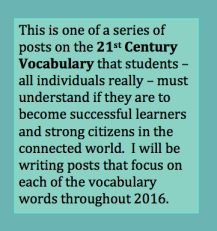
When my brother and I were growing up in the Midwest, my dad had a big sign — about one foot by two feet — with the word MODERATION. The sign sat in the living room, just off the study, so that it was impossible to miss when we were watching television, reading, doing our homework, playing games, eating, and entering or leaving the house. Dad’s goal was for us to think as often as possible about self-regulating and managing what we did each day, even when we were even engaged in a favorite (or not so favorite) activity.
Understanding the importance of moderation is increasingly critical today as we live 21st Century lives that center on the media and on the digital devices that we — and our children — carry around all day long. Read an earlier post on moderation.

You hear a lot these days about people eagerly pursuing their passions — which is great — but we don’t hear nearly as much about moderation. Understanding how to moderate and, yes, self-regulate daily activities is a digital world literacy skill for everyone at every age. For each child who cannot disconnect from Minecraft or other video games, there’s an adult, often a parent, who can’t put the phone down while taking a walk with kids or who uses the phone while driving. Everyone needs to learn how to moderate and disengage, and possessing these skills helps people develop digital strength and wellness.
It’s not only about technology. Moderation is understanding how to stop after a certain amount of time and how to balance different types of activities, even when a favorite — a passion even — begs to monopolize time.
Schools, educators, parents, and kids need to focus on self-regulation and moderation.
At school, while honoring the learning passions that students possess, we educators need to encourage balance by making new choices and welcoming change and by asking students to discover, explore, and pursue unfamiliar topics seriously, while working and playing with a range of other people. One cannot overestimate the power of gently nudging children toward new areas of learning.
In our connected world, schools and educators can make significant quality of life contributions to families who want to develop moderation skills by offering guidance and information on home digital life. Schools can make suggestions about contracts and agreements, family media plans, device usage limits setting, and ensuring familiarity with a child’s digital life and devices. Teachers can encourage the parents of their students to set aside times for device-free interaction, develop homework strategies, and understand more about doing homework research online. It’s important for parents to understand that more is not necessarily better when a child is devoted to video games or coding and loves spending lots of time at these activities.
At home, perhaps the most critical moderation decision that parents can make is to model the digital life behavior that they want their children to adopt. Too many adults these days use their phones at meals, on walks with children or babies, or when they are watching their children’s sports events or school presentations. Moderating this behavior is essential because kids know when their parents are not really paying attention. They learn far more from a parent’s behavior than they do from a parent’s instructions.
Theodore (Ted) and Nancy Sizer wrote a book about modeling and moderation, The Children are Watching. It’s one of my favorite books to share with colleagues and parents because it makes the case, again and again, that what adults do teaches far more than what they say. Moderating adult behavior is crucial. My favorite quote from the book is:
They watch us all the time. The students, that is. They listen to us sometimes. They learn from all that watching and listening.
